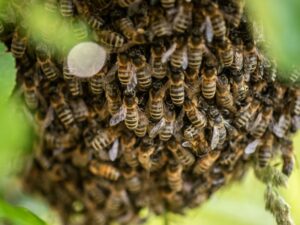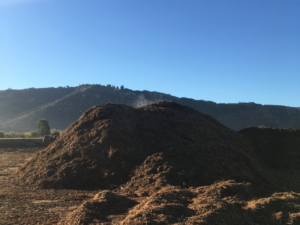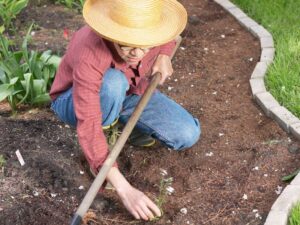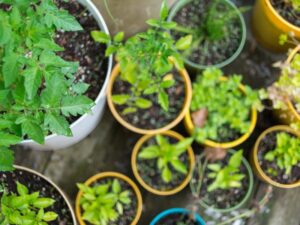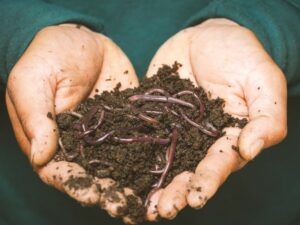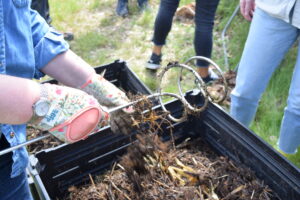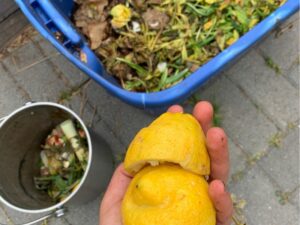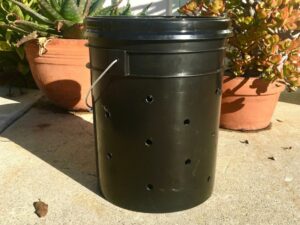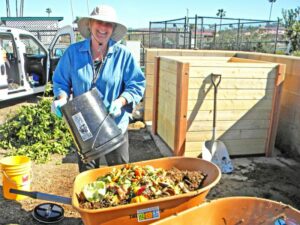Soil & Compost
Climate Solutions: How to Manage Bee Swarms in Your Compost Bin
What Should You Do First? Many of us know that bees serve a vital role in the environment as pollinators, and that their populations have seen a concerning decline in recent years. However, it can still be alarming when a swarm of honeybees chooses to land around our home– including the inside of a compost…
Read MoreComposting Key to Regenerative Agriculture
There’s a lot of buzz about regenerative agriculture, particularly its ability to capture carbon in soil and in aboveground biomass, as well as its many benefits for farmers, consumers, and local environments. According to regenerative agriculture, the answer lies beneath our feet. Soil loss is a global problem and growing worse around the world, at…
Read MoreClimate Solutions: Can Weeds be Composted?
There is not a simple yes or no answer to this query. Weeds have many nutrients so they are a great addition to the compost pile, but you do not want compost filled with viable weed seeds. The best time to take care of weeds is when they are small and have not established deep…
Read MoreClimate Solutions: How Do I Add Compost to Container Plants?
Container gardening is an incredible solution to a variety of growing woes, especially when it comes to the creative and economical use of space. Gardeners lacking backyards or yards with full sun exposure, gardeners working with truly difficult soil, and new gardeners looking to gain confidence in the craft are common beneficiaries of the practice.…
Read MoreClimate Solutions: Is Ink Bad for Worms?
Question: May I add shredded mail and computer paper to my worm and garden compost bins? Are the inks toxic? Answer: That is a frequently asked question, thanks for bringing it to the blog! The inks used today in newspapers, boxes etc. are non-toxic and are readily broken down through composting. However, the see-through address…
Read MoreClimate Solutions: What should I do with my worms while on a trip?
Question: “What should I do with my worms while on a trip?” Answer: Depending on the length of your trip, you will likely not need to do anything at all. Even a new population of worms only needs to be monitored every few days to assess how much food was eaten, moisture levels, and whether they need…
Read MoreClimate Solutions: Aerators? What are those for?
Too lazy to turn your compost bin? Is it not easy to turn, or smells bad? If you answered yes to any of these questions, an aerator could be the right tool for you! Aeration (or the addition of air) is a very important ingredient in your compost pile. The microbes breaking down all the…
Read MoreComposting worms don’t like citrus or spicy foods – here’s why!
If you have a worm bin at home you may already know that red wriggler composting worms have a big appetite. Some would say that the way to a worm’s heart is through their stomach! But just like humans, worms have food preferences and favorites. As a general rule, scraps that you would normally put down the…
Read MoreDIY: How to build your own in-ground worm bin
An in-ground worm bin is an alternative to multi-layer worm bins that sit above ground level. Though an in-ground bin can be made from various materials, a simple and cost-effective bin can be made with a 5-gallon bucket; we’ll share how in this tutorial in a few simple steps! In-ground worm bins have a number…
Read MoreCase Study: Food Cycle Community Compost Program
At the end of 2023, Solana Center made the difficult decision to end the Food Cycle Community Compost program. With the rollout of curbside green recycling bins, we had seen a steady participation decline, and continuing the program was no longer sustainable for our organization. We are so grateful for all of the residents and…
Read More
